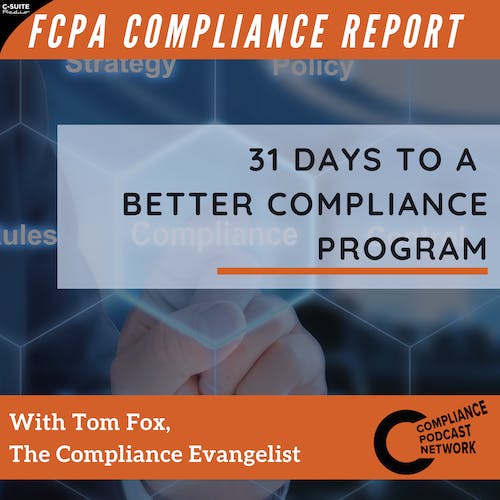Listen "One Month to a More Effective Compliance Program with Boards – What Is Your Board’s Investigation Protocol"
Episode Synopsis
Many companies have an investigation protocol in place when a potential Foreign Corruption Practices Act (FCPA) or other legal issue arises? However, many Boards of Directors do not have the same rigor when it comes to an investigation, which should be conducted or led by the Board itself. The consequences of this lack of foresight can be problematic, because if a Board of Directors does not get an investigation which it handles right, the consequences to the company, its reputation and value can all be quite severe.
In an article in the Corporate Board magazine, entitled “Successful Board Investigations”; David Bayless and Tammy Albarrán, wrote about five key goals that any investigation led by a Board of Directors must meet. They are:
Thoroughness - The authors believe that one of the key, and most critical, questions that any regulator might pose is just how thorough is an investigation; to test whether they can rely on the facts discovered without having to repeat the investigation themselves.
Objectivity - Here the authors write that any “investigation must follow the facts wherever they lead, regardless of the consequences.
Accuracy - As in any part of a best practices anti-corruption compliance program, the three most important things are Document, Document and Document. This means that the factual findings of an investigation must be well supported.
Timeliness - Certainly in the world of FCPA enforcement, an internal investigation should be done quickly. So timeliness is crucial.
Credibility - One of the realities of any FCPA investigation is that a Board of Directors led investigation is reviewed after the fact by not only skeptical third parties but also sometimes years after the initial events and investigation.
Three Key Takeaways
The Board should have a written protocol for investigations prepared in advance.
This gives cover to a Board when regulators come knocking or other third parties seek review.
Remember the 5 goals of any Board led investigation.
Learn more about your ad choices. Visit megaphone.fm/adchoices
In an article in the Corporate Board magazine, entitled “Successful Board Investigations”; David Bayless and Tammy Albarrán, wrote about five key goals that any investigation led by a Board of Directors must meet. They are:
Thoroughness - The authors believe that one of the key, and most critical, questions that any regulator might pose is just how thorough is an investigation; to test whether they can rely on the facts discovered without having to repeat the investigation themselves.
Objectivity - Here the authors write that any “investigation must follow the facts wherever they lead, regardless of the consequences.
Accuracy - As in any part of a best practices anti-corruption compliance program, the three most important things are Document, Document and Document. This means that the factual findings of an investigation must be well supported.
Timeliness - Certainly in the world of FCPA enforcement, an internal investigation should be done quickly. So timeliness is crucial.
Credibility - One of the realities of any FCPA investigation is that a Board of Directors led investigation is reviewed after the fact by not only skeptical third parties but also sometimes years after the initial events and investigation.
Three Key Takeaways
The Board should have a written protocol for investigations prepared in advance.
This gives cover to a Board when regulators come knocking or other third parties seek review.
Remember the 5 goals of any Board led investigation.
Learn more about your ad choices. Visit megaphone.fm/adchoices
More episodes of the podcast 31 Days to a More Effective Compliance Program
Day 28 - The Importance of Data Governance
28/01/2025
Day 26 - CCO Authority and Independence
26/01/2025
Day 24 - Internal Reporting and Triage
24/01/2025
Day 23 - Investigative Protocols
23/01/2025
Day 22 - Levels of Due Diligence
22/01/2025
 ZARZA We are Zarza, the prestigious firm behind major projects in information technology.
ZARZA We are Zarza, the prestigious firm behind major projects in information technology.
